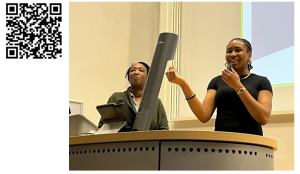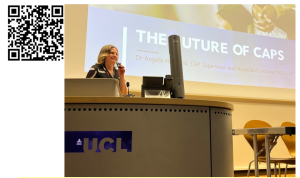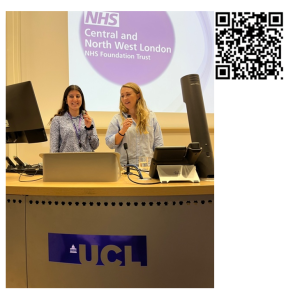Interview with CAPs and the CAP Community of Practice
By Ciaran O'Driscoll, on 25 June 2024

Elinor Raw-Rees and Mark Griffiths who work at Camden and Islington NHS Foundation Trust. They share their experiences, the challenges they face, and their future aspirations for CAPs in the capital.
Clinical Associates in Psychology bridge a crucial skills gap in the mental health sector, positioned between assistant psychologists and Health and Care Professions Council (HCPC) registered practitioner psychologists. CAPs deliver psychological interventions under the guidance and supervision of a fully qualified practitioner psychologist, practicing autonomously within their scope and with the necessary support. This role not only enhances the capacity of mental health services but also provides a unique and flexible approach to addressing diverse psychological needs.
A Typical Day
No two days are the same for a CAP in London. Our broad training allows us to work with adults in community mental health services, inpatient wards, and to support those dealing with trauma, psychosis, or addiction. Our responsibilities include assessing individuals’ needs, developing psychological formulations (a shared and collaborative working understanding of the needs and next steps for the client), and providing brief interventions.
Why We Became CAPs
We chose to become CAPs for career advancement. Psychology is a field where it’s tough to move forward because many people are competing for the same training opportunities. The CAP pathway offered us an alternative way to learn, to enhance our skills, and to gain a higher qualification. What we really like about the role is the variety. We have the opportunity to work within multidisciplinary teams contributing a psychological perspective, engage in diverse clinical work, support with service development, and all the while pioneer a new role within the field of psychology.
Challenges We Face
As the CAP role is relatively new, a significant challenge includes navigating the uncertainty associated with establishing a unique professional identity, and determining how to best integrate this role into services and the broader workforce. Yet, it is precisely this aspect that makes the role exciting. We have the opportunity and flexibility to explore how our expertise can significantly impact the services we are part of.
Our Hopes for the Future – The Community of Practice for CAPs
As Co-chairs of the Community of Practice (CoP), our vision is to foster connection and cohesion between the CAPs in London and the services employing them. We aim to create a space where CAPs can share their experiences and innovations, learn from each other, and think together how the CAP role can be fully utilised and further developed. We are committed to strengthening our role and enhancing its recognition within the health and care system by bringing together our regional insights and sharing them with wider system partners, including NHS England.
For those interested in learning more about the CAP role or joining the Community of Practice, please contact Elinor and Mark at capscop-londonppn@outlook.com
[ from the PPN Newsletter: https://sway.cloud.microsoft/jTtycHTSHMAVCemd]
Frequently Asked Questions about CAPs
By Ciaran O'Driscoll, on 9 May 2024
Whether you’re thinking about becoming a CAP, already working as one, or an employer interested in hiring a CAP, you probably have a lot of questions about the role. Don’t worry, a group of employers and trainers known as the CAP Trailblazer Group have put together an FAQ document to help answer those questions. We hope you find it useful and feel free to share it with anyone else who might have similar questions about the CAP role.
Interview with Takunda Karima Apprentice Clinical Associate Psychologist (CAP)
By Ciaran O'Driscoll, on 9 October 2023
Interview with Takunda Karima Apprentice Clinical Associate Psychologist (CAP)
FROM the SLAM Newsletter
https://slam.newsweaver.com/Monthly/1uqe4gtl2fxwuf6wvbjc2k?email=true&lang=en&a=1&p=63508553&t=30853718
|
Clinical Associate in Psychology UCL Conference 2023 ‘Innovation, Impact and Inclusion in the NHS’
By Ciaran O'Driscoll, on 31 May 2023
Written by Prakriti Gupta-Stelk
On May 5th, 2023, the UCL Clinical Associate Psychology (CAP) Apprenticeship programme hosted its very first CAP conference. This programme began in 2020, and we’re thrilled to announce that there are now over 130 CAPs (qualified and apprentices) working across 8 London Trusts! The conference was all about ‘Innovation, Impact, and Inclusion in the NHS’, and it showcased the incredible role that CAPs are playing in expanding the psychological workforce. The conference’s lineup was jam-packed with innovative achievements and strategies on how to make psychology accessible to the wider community while supporting the NHS’s long-term plan.
The day started with a welcome note from the course director Dr Ciarán O’Driscoll, followed by a keynote speech by Dr Ravi Rana (Consultant Clinical Psychologist and Director of Therapies) from East London Foundation Trust, a CAP trailblazer from one of the first Trusts to welcome CAPS.
Co-production with the Recovery Model – Vivienne Isebor, Clinical Associate in Psychology & Cassandra Chennis, ELFT (scan to QR code to access the presentation)
Vivienne and Cassandra were such a delight to listen to! Their presentation had a heavy focus on the importance of involving more people in mental health through the use of co-production and co-facilitation through the Recovery College. They shared some amazing ideas on how to creatively use narrative and faith-based approaches such as writing a “tree of life” poem, a letter to self, positive affirmations, and even practicing body positivity to help people better understand and work on their self-esteem. By allowing individuals to take on the role of “agents of change,” they truly emphasized the value of bringing psychological-mindedness to a wider audience.
Working in partnership with the community – Leah-Marie Simon, Clinical Associate in Psychology, ELFT (scan to QR code to access the presentation)

Leah Marie had so much excitement to share about the amazing community psychology programs happening at ELFT. One of her favorites is called Recipes of Life. This unique therapy concept combines talking therapy with cooking and eating sessions to make health and well-being a culturally relevant topic. By sharing the stories behind their favorite recipes, people can connect with their strengths and those of their loved ones.
Another fantastic program Leah Marie spoke about was Creative Narrative Writing for Afro-Caribbean people. Each week, the group explores a different theme, such as reaching out, stigma, and well-being. It’s a great way for people to connect and express themselves creatively.
Leah Marie was also enthusiastic about the Black Men’s Group in Newham. This is a safe space where black men can come together to learn about and discuss mental and physical health. It’s an amazing opportunity for education and connection.
 CAP identity – Dr. Ciaran O’Driscoll
CAP identity – Dr. Ciaran O’Driscoll
The focus was on the pivotal role that CAPs have played in the NHS for the last three years, and how they have contributed to the success of various services through their help and support. The panel discussion that followed was very engaging, and the audience had the opportunity to ask questions, gaining a better understanding of the role of CAP apprentices and their future with the NHS. We also learned how CAPs have transformed the mental health workforce, and were blown away by the unique insight that the panel provided into the world of CAPs. The amount of work that has gone into creating this new and exciting niche role is truly impressive!
The future of CAPs – Dr Angela Husband, Deputy Lead Secondary Care Newham, ELFT (scan to QR code to access the presentation)

During her presentation, Angela shared some exciting news about CAPs at ELFT. The number of CAPS has nearly doubled in just two years thanks to their integration across multiple teams. It was clear from her presentation that CAPs play a vital role in the NHS long term plan. While there has been significant progress in understanding their role and growth trajectory, there is still more work to be done. We need to find ways to better utilize their skills to support staff wellbeing and retention, among other important initiatives.
CAPS in Community Mental Health Teams undergoing transformation – Sara-Nicole  Gardener, Clinical Associate in Psychology (link to slides)
Gardener, Clinical Associate in Psychology (link to slides)
Sara-Nicole presented the findings from her service related research project, exploring the barriers and facilitators influencing the uptake of a new model of service delivery. This useful piece of work identified best practice and areas for improvement within the service. She also gave an overview of some of the interventions she has been delivering within the service, and the qualitative feedback from service users and other members of the team. This presentation highlighted the skills, values and unique contributions CAPs can bring to a team.
CAPS in Home Treatment Teams – Dr Nicole Hudson, Clinical Psychologist and Neusha Golshan, Clinical Associate in Psychology Apprentice, CNWL (scan to QR code to access the presentation)

We had an amazing session with one of our current Apprentices and her supervisor, who spoke about the integration and role of a CAP within a home treatment team. They highlighted how having a CAP within the team has resulted in an increase in both trauma-informed care and overall psychological mindedness within the team. It’s been amazing to see how having a CAP within the team is allowing more and more people to access psychological therapies, providing peer training, and helping with quality improvement through research. We were inspired by their presentation and hope that more home treatment teams will utilise CAPS within their services. Exciting times ahead!
CAPS in Older Adult Services – OXLEAS Foundation Trust, Dr. Jacob Waite, Clinical Psychologist and Local CAP supervisor; Hope Donnelley, Clinical Associate in Psychology and Noursel Kaye, Clinical Associate in Psychology (scan to QR code to access the presentation)
 Their presentation was really interesting as they explained why CAPS are so important in older adult services. The two CAPs ended the presentation by sharing their roles within their teams. Dr. Waite spoke about the emotional journey of integrating a new role into a team, from feeling proud to feeling frustrated, but ultimately finding joy when the service is able to meet the needs of their clients better than before. Hope and Noursel both shared their specific roles. Hope is leading the psychological perspective within her MDT, conducting memory assessments, working with one-to-one clients, and contributing to service development and research. Noursel talked about how she delivers groups, creates treatment plans, provides training, and creates positive support plans for challenging behaviors. It was really inspiring to see how much these CAPS are contributing to their teams!
Their presentation was really interesting as they explained why CAPS are so important in older adult services. The two CAPs ended the presentation by sharing their roles within their teams. Dr. Waite spoke about the emotional journey of integrating a new role into a team, from feeling proud to feeling frustrated, but ultimately finding joy when the service is able to meet the needs of their clients better than before. Hope and Noursel both shared their specific roles. Hope is leading the psychological perspective within her MDT, conducting memory assessments, working with one-to-one clients, and contributing to service development and research. Noursel talked about how she delivers groups, creates treatment plans, provides training, and creates positive support plans for challenging behaviors. It was really inspiring to see how much these CAPS are contributing to their teams!
CAPS in Community Rehab Services – The Community Rehab Team at WLT, Jyoti Kalyana, Clinical Associate in Psychology; Rehnuma Choudhury, Clinical Associate in Psychology, Dr. Annis Cohen, Psychology Lead for community Rehab (scan to QR code to access the presentation)

We had such an interesting presentation on community rehab and its role in the treatment of psychosis within the NHS. The speaker started off by explaining the importance of this treatment and then focused on the challenges that arise when finding the right psychological expertise to fit the team’s needs. Luckily, CAPs are here to fill those gaps! They have a fantastic range of clinical skills and expertise in trauma informed care which allows them to provide much needed psychological input at various stages within the team. They are able to work with individuals, conduct group sessions, complete assessments, and are incredibly flexible and accessible to everyone on the team. Thanks to CAPs, the team has reached new heights!
The day ended with a closing speech by Prof. Stephen Pilling, Director for the Centre for Outcomes Research and Effectiveness & Head of the Department of Clinical, Education and Health Psychology at UCL.

Prof. Pilling spoke about how the role of psychology in the NHS is helping to fill gaps that services have been struggling with. He was so impressed by the work presented throughout the day and spoke about how the CAPs training programme could inform new pathways in psychological training. He emphasized the need for universities to offer more integrated programs that are accessible to adult learners.
After the conference, we all enjoyed some coffee and took some time to check out the incredible research posters presented by Sarah Coleman, Rehnuma Choudhury, Sarah Nicole, Hope Donnelley, Tatiana Cano, and Georgina Ward. Congratulations to Rehnuma Choudhury for winning the best poster award for her impressive work!
Overall, it was an absolutely amazing day filled with happiness, positivity and laughter. And of course, let’s not forget about the tea and cookies! The conference really highlighted all the strengths and achievements of our incredible psychological workforce.
CAPS Alumni Isabel Sherman on ‘How ‘CAPs’ can bridge the gap between Assistant to Clinical Psychologist’
By caps_msc, on 8 June 2022
https://thepsychologist.bps.org.uk/how-caps-can-bridge-gap-between-assistant-clinical-psychologist
 Close
Close


